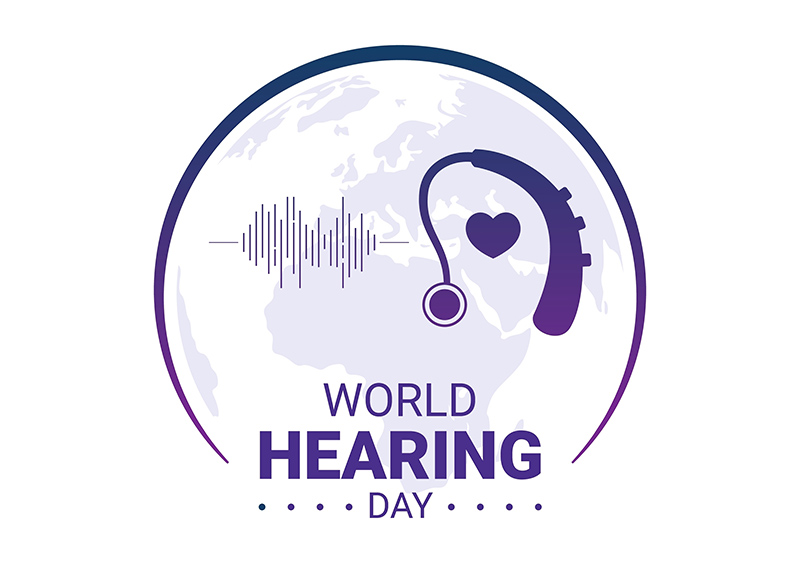World Hearing Day | March 3, 2024
World Hearing Day is far from a symbolic gesture — for the millions of people worldwide who live with varying degrees of hearing loss, it is an opportunity to illuminate the importance of sound in our lives. As we approach World Hearing Day 2024, it's essential to understand the day's significance and explore how we can improve our hearing health and support others within our community who may be struggling with auditory challenges.
Significance of World Hearing Day
World Hearing Day is a cornerstone in the ongoing campaign for hearing care, a vital component of public health that often goes unacknowledged. This day unites individuals, professionals, and policy-makers to promote the theme decided by the World Health Organization (WHO), addressing issues that affect the hearing impaired on a global scale. The goal is simple: to prevent hearing loss wherever possible and provide better access to care and rehabilitation services for those suffering from the condition.
In previous years, themes have ranged from preventing noise-induced hearing loss to the early identification and intervention for those affected. Every theme is a step forward, advocating for a world without communication barriers. This year, the focus is geared toward a topic crucial for personal health and communication: "Let’s make ear and hearing care a reality for all!"
Understanding Hearing Loss
Hearing loss is an invisible but incredibly significant global health issue. The NIDCD highlights that 15% of the world's adult population has some form of hearing difficulty. This percentage is more significant when we acknowledge the role hearing plays in our overall quality of life. Hearing loss can significantly impact language development in children and lead to feelings of isolation, frustration, and reduced social participation amongst all age groups.
Causes and Prevalence
Hearing loss can be caused by genetics, problems with the ear structure, infections, certain infectious diseases, ear infections, the use of medications, exposure to excessive noise, and aging.
Impact on Individuals and Society
The repercussions of hearing loss are multi-faceted, affecting various aspects of one's life. Beyond its personal impact, hearing loss also has significant societal implications, with economic costs due to unaddressed hearing loss running into the billions. As we recognize World Hearing Day, we’re reminded that hearing health is not just an individual matter; it's a societal responsibility.
Preventive Measures
While not all hearing loss can be avoided, there are steps we can take to minimize the risks.
Importance of Regular Check-Ups
Like dental check-ups, regular hearing screenings should be part of everyone's annual health routine. Early hearing loss detection can lead to more better treatment and quality of life for those affected. If you have trouble understanding conversations, turning up the volume excessively, or asking others to repeat themselves — it's time to schedule an appointment with a hearing care specialist.
Hearing Protection Tips
Noise-induced hearing loss, which is often preventable, is one of the most common types of hearing impairment. Protecting your ears from loud sounds is critical, especially when the exposure is prolonged or repeated. Simple measures like earplugs or earmuffs can provide adequate protection in noisy environments.
Construction sites, live concerts, and even the regular use of personal audio devices set at high volumes can all pose a risk. Recommendations from health organizations suggest adopting the '60/60' rule when using earphones — listening at 60% of the maximum volume for no more than 60 minutes at a time.
Innovations in Hearing Technology
Advancements in hearing aid technology have been revolutionary, offering more options, comfort, and improved performance. These innovative devices provide a lifeline to those with hearing loss, connecting them to the world of sound and communication.
Latest Advancements in Hearing Aids
The latest hearing aids have sophisticated features that cater to various listening environments. Directional microphones help wearers focus on the sounds they want to hear, whether it's a conversation partner or a lecture. Bluetooth connectivity turns hearing aids into wireless headphones, streaming audio directly from smartphones and other devices.
State-of-the-art hearing aid designs are also more discreet and comfortable, with advancements such as rechargeable batteries and waterproof casings contributing to ease of use and enhancing the user experience.
Support and Awareness
The themes explored on World Hearing Day go beyond mere technical solutions for hearing loss. They remind us to be advocates for those with auditory challenges and to support them in leading whole, unimpeded lives.
Community Resources
Local support groups and organizations play a crucial role in the lives of those with hearing loss and their families. These groups provide a sense of community, support, and resources for coping strategies. Whether through educational workshops, peer-to-peer support, or access to assistive technologies, community resources can make a world of difference.
Advocacy for Inclusivity
Advocacy is a powerful tool in promoting awareness and inclusivity. By advocating for policies that ensure equal access to educational and workplace accommodations, we create a more inclusive environment for those with hearing loss. Awareness campaigns aimed to reducing the stigma associated with hearing aids and encouraging open dialogue about hearing health are equally vital in fostering a society that respects and supports those with auditory challenges.
Conclusion
World Hearing Day 2024 is more than just another item on the global health calendar. It's an opportunity to reflect on the role of hearing in our daily lives and to consider what we can do to protect and promote this essential sense. As the theme urges us to urge hearing care, it's a personal and collective reminder to prioritize our hearing health. Contact us at Beltone Dallas Fort Worth to get started on your hearing health journey.
Committing to regular hearing screenings and knowing the signs of hearing loss supports early intervention and can vastly improve outcomes. Additionally, offering support to those with hearing loss by being patient, offering clear communication, and being an ally in their health and wellbeing is a simple yet crucial action we can all take.






